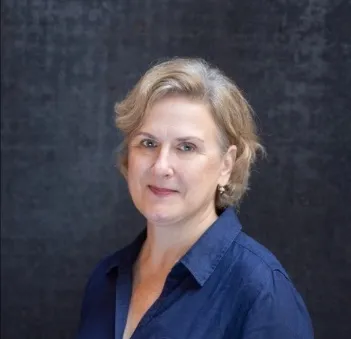Professor Barbara Milewski Awarded the USHMM Joyce & Arthur Schechter Fellowship

Professor Milewski, Daniel Underhill Professor of Music at Swarthmore College, specializes in Polish music and questions of national identity and memory. This academic year she has been named the Joyce and Arthur Schechter Fellow at the United States Holocaust Memorial Museum’s Jack, Joseph and Morton Mandel Center for Advanced Holocaust Studies. The Fellowship provides her the opportunity to complete research on her manuscript, The Corpse-Carrier’s Tango and Other Songs of the Living, by working within the Aleksander Kulisiewicz Collection. The manuscript explores music making in the Sachsenhausen, Buchenwald, and Auschwitz-Birkenau concentration camps.
The Aleksander Kulisiewicz Collection is what initially inspired Professor Milewski to study this subject so extensively. During her graduate studies, she was invited to the United States Holocaust Memorial Museum to help catalog the collection. It is composed of recordings, scores, letters, poetry, artworks, photographs, and research notes collected from concentration camp survivors by Aleksander Kulisiewicz. Kulisiewicz himself survived Sachsenhausen and dedicated his life to collecting any and all records related to cultural activities in the camps. The collection made a strong impact on Professor Milewski, and inspired her to return to the Collection to conduct her own research.
When coming to understand this subject, Professor Milewski emphasized the importance of knowing Polish history. While researching Chopin, she explored how Poles used music to preserve a sense of national identity, even when no Polish state existed between 1795 and 1918. In much the same way, Polish political prisoners used music to maintain a sense of their identity in the concentration camps during WWII. “To study musical nationalism in the context of Poland is to allow ourselves to draw this through line of oppression and understand the ways in which one preserves one's cultural heritage . . . I'm inspired by looking at these moments of crisis, periods of destruction and erasure, and seeing how music serves–and preserves–the nation.”
In terms of key takeaways from her book, she stressed the importance of broadening what many consider to be the subject of “music of the Holocaust.” She explained that much attention to date has been given to musical works created by professional composers in Theresienstadt. Concert programs that feature music of the Holocaust naturally focus on such compositions because they are both aesthetically appealing and historically compelling. However, she says that the largest record of music from concentration camps comes in the form of parody songs. This style of music takes pre-existing songs and adds new lyrics to the melody. Many of these parody songs are critical or sardonic of the treatment and conditions of prisoners at the hands of the SS. “I'm not at all concerned about the aesthetic properties of this music so much as what it reveals to us about how prisoners turned to these forms of creative work in order to sustain themselves . . . knowing that if you were caught you were going to the gallows. That's just really compelling for me,” explains Professor Milewski.
A prominent example of this style is a camp song called Heil, Sachsenhausen. The original Polish cabaret song from which it borrows its melody, Madagaskar, was created in 1938 in order to mock a government scheme to deport Poland’s Jews to that island off the coast of East Africa. The camp song’s lyrics take aim at the Nazi ban on Rassenschande (“race defilement” or “mixing”) first applied to sexual relations between German “Aryans” and Jews, then made illegal between Germans and political prisoners, most of whom were ethnic Slavs. Professor Milewski explained that, “This [song] is, and this was, a venue for discussing the disturbing politics of the day. You essentially pointed out the preposterousness of it all by turning it into a dark joke,” just as songwriters and singers had done before the war.
Professor Milewski wishes to express her sincerest gratitude for being awarded the Joyce and Arthur Schecther Fellowship. “I really am grateful for the fellowship which let me have time at the United States Holocaust Memorial’s Museum Shapell Center, and for the year-long sabbatical afforded to me by the College to be able to finally just be in my thoughts and get [the work] written.”
If you’re interested in learning more about this subject and others like it, Professor Milewski encourages you to take her "Music and War" class. You might also read Chopin's Żydek, and Other Apocryphal Tales, an article she co-authored with the Music Collection Curator at the U.S. Holocaust Memorial Museum, Dr. Bret Werb. The article explores Chopin’s alleged interactions with Jewish music and addresses common misconceptions about it. The work was recently awarded the Aquila Polonica Prize by the Polish Studies Association.



